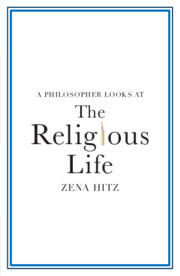Book contents
- A Philosopher Looks at the Religious Life
- A Philosopher Looks at
- A Philosopher Looks at the Religious Life
- Copyright page
- Dedication
- Contents
- Acknowledgments
- What Is This Book About?
- Introduction
- 1 The Call
- 2 Blessed Are the Poor
- 3 Intimacy with God
- 4 The Family of Humanity
- 5 Abandonment and Freedom
- Conclusion
- Notes
- Bibliography
- Index
5 - Abandonment and Freedom
Published online by Cambridge University Press: 23 December 2022
- A Philosopher Looks at the Religious Life
- A Philosopher Looks at
- A Philosopher Looks at the Religious Life
- Copyright page
- Dedication
- Contents
- Acknowledgments
- What Is This Book About?
- Introduction
- 1 The Call
- 2 Blessed Are the Poor
- 3 Intimacy with God
- 4 The Family of Humanity
- 5 Abandonment and Freedom
- Conclusion
- Notes
- Bibliography
- Index
Summary
The love of enemies requires the capacity to see one’s sufferings as good, as successes or blessings. This kind of vision is an aspect of a broader condition, known as abandonment. In the state of abandonment, one accepts not only human wrongdoing as from the hands of a beloved enemy, but any disaster, natural or otherwise, as coming from the hand of God in his providence.1 The state of abandonment is the end for which total renunciation is an effective means. But as we shall see -- as perhaps we have already seen -- vows, promises, and penances are neither necessary nor sufficient to achieve it.
- Type
- Chapter
- Information
- A Philosopher Looks at the Religious Life , pp. 140 - 159Publisher: Cambridge University PressPrint publication year: 2023

